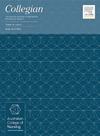护生痴呆护理职业意向量表的编制与心理测试:方法学研究
IF 1.7
4区 医学
Q2 NURSING
引用次数: 0
摘要
痴呆症的发病率不断上升,需要更多、更熟练的护理人员来满足日益增长的护理需求。目的编制护生痴呆护理职业意向量表,并对其心理测量特性进行验证。方法本研究分五个步骤进行:(i)确定理论框架,(ii)开发题库,(iii)初步题库评估,(iv)题库分析,(5)心理测量评估。共有532名护生参与调查。研究结果建立了一个包含感知行为控制、行为态度、行为意图和主观规范四个维度的28项量表,解释了66.013%的总方差。模型拟合良好(χ²/df = 1.610, RMSEA = 0.048, CFI = 0.959, TLI = 0.955, IFI = 0.959)。标准相关效度令人满意(r = 0.46, p < 0.001)。量表总体信度较高,Cronbach′s α为0.941,类内相关系数为0.984。本研究确定了行为态度、主观规范和感知行为控制对护理学生对痴呆症护理的职业意向的影响,并建议加强专业培训,促进积极的专业态度,减少社会偏见,以鼓励更多地参与痴呆症护理。结论该量表具有较强的心理测量特性,可作为评估护生痴呆护理职业意向的可靠有效工具。本文章由计算机程序翻译,如有差异,请以英文原文为准。
Development and psychometric testing of the scale for Nursing Students’ Career Intentions towards Dementia Care (NSCIDC): A methodological study
Background
The rising prevalence of dementia necessitates a larger and more skilled nursing workforce to meet the growing demand for care.
Aim
This study aims to develop the Nursing Students’ Career Intentions towards Dementia Care (NSCIDC) scale and validate its psychometric properties.
Methods
The research was conducted in five steps:(i) determining the theoretical framework, (ii) development of the item pool, (iii) preliminary item evaluation, (iv) item analysis, (5) psychometric evaluation. A total of 532 nursing students participated in the survey.
Findings
A 28-item scale comprising four dimensions was developed: Perceived Behavioural Control, Behavioural Attitude, Behavioural Intention, and Subjective Norm, explaining 66.013% of the total variance. The model exhibited good fit (χ²/df = 1.610, RMSEA = 0.048, CFI = 0.959, TLI = 0.955, IFI = 0.959). Criterion-related validity was satisfactory (r = 0.46, p < 0.001). The overall scale reliability was high, with a Cronbach’s α of 0.941 and an intraclass correlation coefficient of 0.984.
Discussion
The study identified behavioural attitude, subjective norm, and perceived behavioural control as influences on nursing students’ career intentions towards dementia care, with recommendations to enhance professional training, promote positive professional attitudes, and reduce societal biases to encourage greater engagement in dementia care.
Conclusion
The scale demonstrates robust psychometric properties and can serve as a reliable and effective tool for evaluating nursing students’ career intentions towards dementia care.
求助全文
通过发布文献求助,成功后即可免费获取论文全文。
去求助
来源期刊

Collegian
NURSING-
CiteScore
2.70
自引率
6.70%
发文量
127
审稿时长
72 days
期刊介绍:
Collegian: The Australian Journal of Nursing Practice, Scholarship and Research is the official journal of Australian College of Nursing (ACN).
The journal aims to reflect the broad interests of nurses and the nursing profession, and to challenge nurses on emerging areas of interest. It publishes research articles and scholarly discussion of nursing practice, policy and professional issues.
Papers published in the journal are peer reviewed by a double blind process using reviewers who meet high standards of academic and clinical expertise. Invited papers that contribute to nursing knowledge and debate are published at the discretion of the Editor.
The journal, online only from 2016, is available to members of ACN and also by separate subscription.
ACN believes that each and every nurse in Australia should have the opportunity to grow their career through quality education, and further our profession through representation. ACN is the voice of influence, providing the nursing expertise and experience required when government and key stakeholders are deciding the future of health.
 求助内容:
求助内容: 应助结果提醒方式:
应助结果提醒方式:


